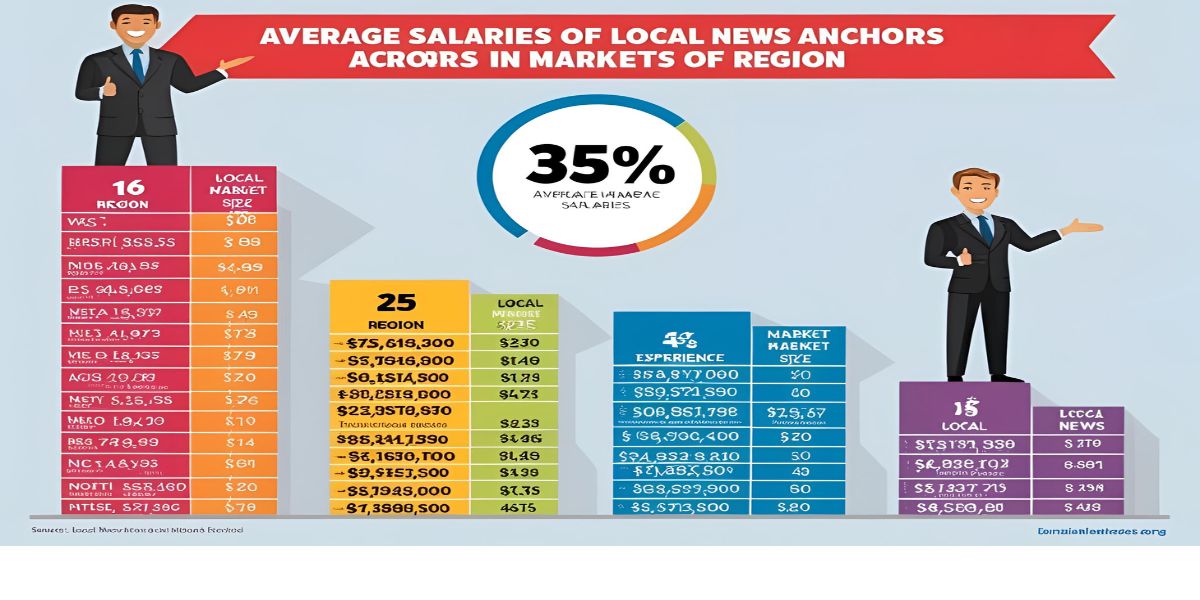You might be surprised to learn just how much local news anchors earn, as their salaries can vary significantly based on several factors. In smaller markets, you could see annual incomes as low as $30,000, while larger markets may offer salaries that soar well beyond $200,000. But what really drives these differences? Understanding the nuances of market size, experience, and education can shed light on this complex topic. And just when you think you’ve got it figured out, there are more elements at play that could change everything.
Overview of Local News Anchor Salaries
When it comes to local news anchor salaries, you might be surprised by the range. Salaries can vary significantly based on factors like market size, experience, and the station’s budget.
In smaller markets, you might see anchors earning between $30,000 and $50,000 annually. These positions often attract newcomers eager to start their careers in broadcasting.
As you move to medium-sized markets, salaries generally increase, with anchors making between $50,000 and $80,000. Here, you’ll find professionals with a few years of experience, honing their skills and establishing a following.
In larger markets, the pay can skyrocket, with salaries ranging from $80,000 to over $200,000. Anchors in these markets often have extensive experience, a strong on-air presence, and established reputations.
It’s also worth noting that prestigious networks may offer even higher salaries, sometimes exceeding $300,000 for top-tier anchors.
In addition, many local news anchors enjoy benefits like health insurance, retirement plans, and bonuses, which can add significant value to their overall compensation package.

Factors Influencing Salary Levels
Several key factors influence salary levels for local news anchors.
First, your experience plays a significant role. If you’ve got years of on-air experience, you’re likely to command a higher salary compared to someone just starting out.
Education also matters; a degree in journalism or communications can enhance your credibility and earning potential.
The size and market of the station where you work can greatly affect your pay. Larger markets with more viewers typically offer higher salaries due to increased competition and revenue.
Additionally, the station’s ownership and funding can impact what they’re able to pay their anchors.
Your role and responsibilities make a difference, too. If you’re not just anchoring but also producing or reporting, you might earn more than an anchor who focuses solely on presenting news.
Networking and personal branding can also play a role; building a strong reputation can lead to better job offers.
Finally, the demand for local news anchors can fluctuate. If there’s a shortage of qualified candidates, salaries may increase as stations compete to attract talent.
Understanding these factors can help you navigate your career and salary expectations more effectively.
Salary Ranges by Market Size
Local news anchor salaries vary significantly based on the size of the market where you work.
In smaller markets, such as those ranked 150 or lower, you might earn between $30,000 and $60,000 annually. These positions often come with limited resources and smaller audiences, which can affect your overall compensation.
As you move up to mid-sized markets, typically ranked between 51 and 150, your salary can increase to the range of $50,000 to $90,000. Here, you’ll likely find more opportunities for professional development and a slightly larger audience.
In larger markets, especially those in the top 50, salaries can soar to between $70,000 and $150,000 or more. These markets usually have bigger stations, more extensive news coverage, and higher viewer ratings, which contribute to increased compensation.
Keep in mind that the cost of living in these areas can also be significantly higher, which might affect how far your salary stretches.
Experience and Its Impact
Experience plays a crucial role in determining a local news anchor’s salary. As you gain more years in the field, your expertise and reputation grow, allowing you to command a higher salary. Typically, entry-level anchors earn less, but as you accumulate experience, you can expect a significant pay increase.
In smaller markets, you might start with a modest salary, but moving to larger markets or stations with more viewership can lead to even bigger raises. Your experience not only enhances your on-air skills but also builds your network, which can open doors to better job opportunities.
Additionally, experienced anchors often take on more responsibilities, such as mentoring new hires or leading special projects. These added duties can further boost your earnings.
You’ll find that seasoned anchors may also have the opportunity to negotiate better contracts or receive performance bonuses based on ratings.

Education and Training Requirements
Often, aspiring local news anchors need a solid educational foundation to succeed in the industry. Most commonly, this means obtaining a bachelor’s degree in journalism, communications, or a related field. These programs equip you with essential skills in reporting, writing, and broadcasting, which are crucial for your future career.
Internships during your college years can also make a significant difference. They provide hands-on experience and help you build a network of contacts within the industry. Many local news stations prefer candidates who’ve practical experience, so getting involved in your campus radio or TV station can be beneficial.
In addition to formal education, you might want to consider taking courses in public speaking and multimedia production. These skills can enhance your on-air presence and make you more versatile in a rapidly changing media landscape.
Finally, while some positions may not require advanced degrees, pursuing a master’s degree in journalism or communication can set you apart from the competition.
Comparing Salaries Across Regions
When considering a career as a news anchor, it’s essential to understand how salaries can vary significantly across different regions. In larger metropolitan areas, like New York or Los Angeles, you can expect higher salaries due to the cost of living and competition. Anchors in these cities often earn six-figure salaries, reflecting the demand for quality journalism in bustling markets.
Conversely, in smaller towns or rural areas, salaries tend to be lower. Local news anchors in these regions might earn anywhere from $30,000 to $60,000 annually. While these positions offer invaluable experience, the trade-off is often a more modest paycheck.
Moreover, regional differences can also stem from the size and viewership of the news station. Larger networks with extensive reach generally offer better compensation compared to local, independent stations.
If you’re flexible about where to work, you might consider starting your career in a smaller market to gain experience before moving to a larger one.
Ultimately, understanding these regional disparities will help you make informed decisions about your career path in local news. Whether you aim for a big city or a quaint town, knowing the salary landscape is crucial.

Benefits and Additional Compensation
In addition to base salaries, local news anchors can benefit from various forms of additional compensation and perks that enhance their overall earnings. Many stations offer health insurance, retirement plans, and paid time off, which can significantly boost your financial security.
You might also receive bonuses for exceptional performance or achieving ratings targets, which can add thousands to your annual income. Some news anchors are eligible for relocation assistance, especially if they’re moving to a new market for a job. This benefit can help ease the financial burden of moving and settling into a new area.
Additionally, you might receive perks like a company car or travel allowances for on-location reporting, which can save you money in the long run.
Furthermore, local news anchors often have opportunities for side gigs, such as hosting events or speaking engagements, which can supplement your income. Networking within the industry can also lead to freelance opportunities, allowing you to utilize your skills beyond your primary job.
Challenges in the Industry
Navigating the local news industry presents several challenges that can impact your career as an anchor.
First, competition is fierce. With countless aspiring journalists vying for limited positions, standing out becomes essential. You’ll need to hone your skills continuously and showcase your unique voice to attract attention.
Next, budget cuts often plague local news stations, leading to reduced staff and resources. This can mean longer hours and increased responsibilities for you, as you might find yourself wearing multiple hats—reporter, editor, and sometimes, even a photographer. This added pressure can be overwhelming.
Additionally, the demand for instant news can compromise the quality of reporting. You may feel the urgency to deliver breaking news quickly, which can lead to mistakes or incomplete stories. Balancing speed with accuracy is crucial, but it can be challenging.
Lastly, audience preferences are shifting. As viewers turn to digital platforms, local news must adapt to stay relevant. You’ll need to embrace new technologies and social media to connect with your audience effectively.
All these challenges require resilience and adaptability, qualities that are vital for success in this dynamic field.
Future Trends in Local News Salaries
As the landscape of local news evolves, you can expect significant shifts in anchor salaries over the next few years. The increasing reliance on digital platforms is reshaping how local news operates, which may lead to varying compensation structures.
You might notice that traditional pay models are giving way to performance-based incentives, where your salary could depend on audience engagement and viewership metrics.
As local news organizations adapt to the changing media environment, they may also prioritize hiring versatile anchors who can handle multiple roles—reporting, editing, and social media management. This multitasking ability could command higher salaries, reflecting the expanded skill set required.
Moreover, as competition intensifies among local stations, you could see an upward trend in salaries to attract and retain top talent.
However, budget constraints in some markets might temper this growth, leading to disparities based on geographic location and market size.
Conclusion
local news anchors’ salaries vary widely based on market size, experience, and education. While entry-level positions in smaller markets might start around $30,000, seasoned anchors in larger markets can earn well over $200,000. As you consider a career in this field, keep in mind the factors that can influence your earning potential. With the right skills and experience, you can find rewarding opportunities that not only pay well but also offer valuable benefits.


